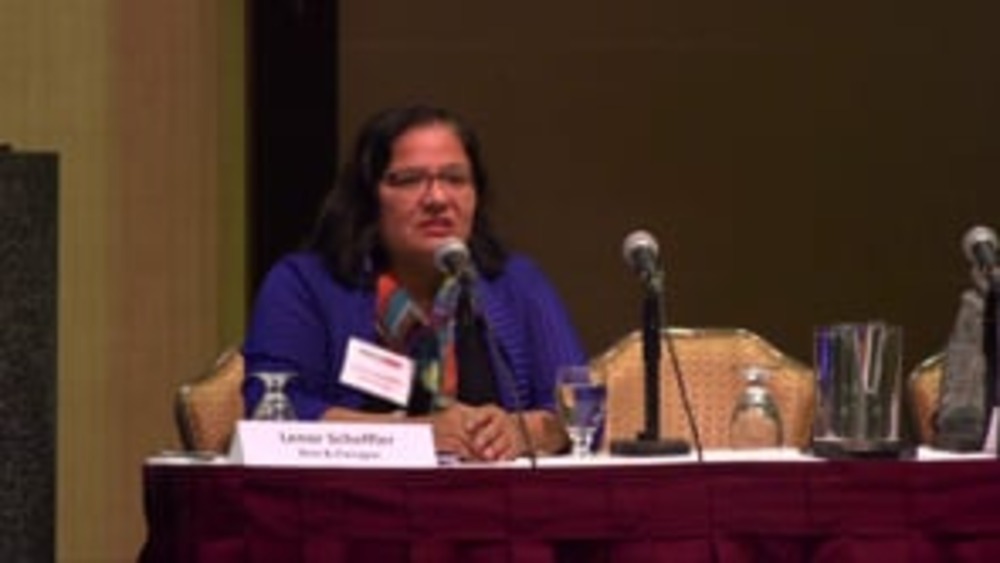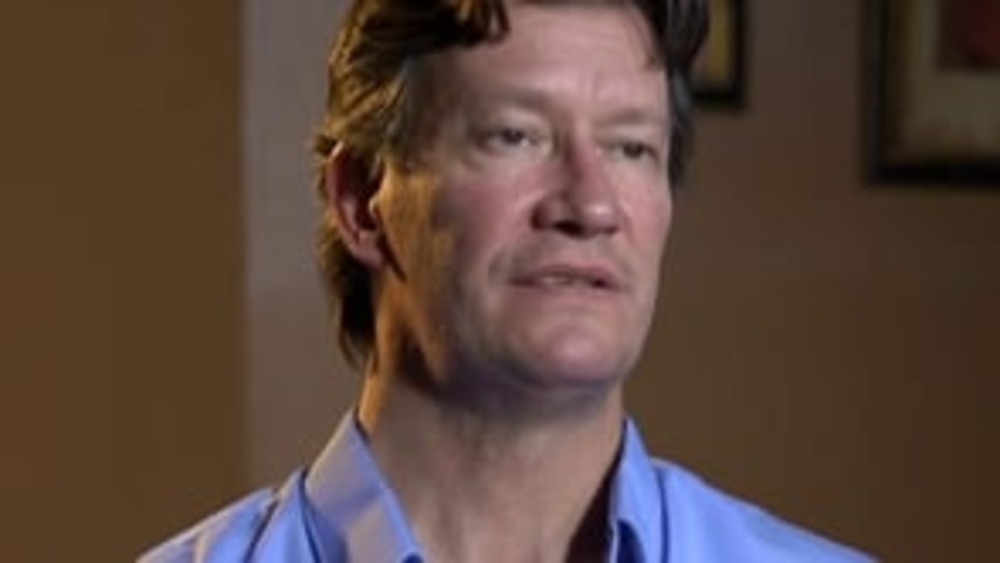Sarah Deer (Muscogee), Co-Director of the Indian Law Program at the William Mitchell College of Law, provides a brief overview of the Muscogee (Creek) Nation's unique approach to defining its citizenship criteria, which essentially creates two classes of citizens: those who run for elected office, and those who can't.
This video resource is featured on the Indigenous Governance Database with the permission of the Bush Foundation.
Additional Information
Deer, Sarah. "The Muscogee (Creek) Nation's Approach to Citizenship." Tribal Citizenship Conference, Indian Law Program, William Mitchell College of Law, in conjunction with the Bush Foundation. St. Paul, Minnesota. November 13, 2013. Presentation.
Transcript
"What I'd like to talk about just very briefly is...first of all, I'm a citizen of the Muscogee (Creek) Nation and I probably...by the way I look, you can tell I'm a lineal descendent as opposed to having a high blood quantum. And I want to talk a little bit about that because one of the things I think -- especially in Oklahoma -- they kind of joke about us. I'm not Cherokee, but they joke about the blonde-haired, blue-eyed Cherokees, and one of the things I think that's really important for someone like me to acknowledge is that I have privilege because of the way I look. I can walk into a store and I'm not treated as an Indian because people don't see me as an Indian.
And when I was talking to one of my mentors, an elder who works to help me try to learn my language, she talked a little bit about that with me recently, about...when she grew up in rural Oklahoma in the 1950s, the level of painful racism in her memory is still very palpable, being treated as second class because of her skin color and because of her name and so today when she sees people who can pass, who don't acknowledge their privilege, who say, ‘I'm a tribal citizen, but I'm just the same as you,' when I didn't go through the experience of racism is painful. And I think we have to talk about that when we talk about lineal descendency because I get the privilege of passing. I get to tell people I'm Indian if I want to and if we don't acknowledge that painful history, I think we're going to continue to have a lot of controversy about what this means to potentially open up citizenship. So I wanted to say that at the outset.
And the other thing that I think is interesting is that I'm asked often what my...how much Indian I am, my blood quantum. But the only people who tend to ask me that are non-Indian people. What Native people ask me is, ‘Who is your family?' So it's...the blood quantum itself is something that is of interest to people, but in my experience that's usually coming from outside the tribe.
Now, what I wanted to talk about was one particular facet of my own tribe's constitution when it comes to governance because we have two classes of citizens. One class is full citizens and the other class is citizens and I want to talk about the difference between the two in just a second. But typically, when we think about American citizenship, the American government really doesn't do much in terms of distinguishing between citizens. All citizens are treated the same. If you're naturalized, you have the same rights and privileges as people who were born here. The one exception that I think became I think a focal point of the election in 2008 was that the president must be a natural-born citizen and so to be the President of the United States you have to have been born here in the country.
So let me tell you about how this Muscogee constitution developed. We have a very complicated history as most tribes do. In Oklahoma in particular we governed...we had really no acknowledgement of our government between 1906 and 1977, 1978. We were still operating as a government, but the federal government didn't recognize us pursuant to the Curtis Act. So when we were able to fight and get recognized as having continuing governance throughout that time period, the federal court actually ordered a constitutional convention, which was interesting and sort of ironic that in terms of re-recognizing the tribal government, the federal judge says, ‘And we will tell you how to do this.' But we did end up ratifying and passing a new constitution in 1979, which governs us today, and citizenship in our nation is determined through lineal descent [from] the 1906 Dawes Roll.
One of the things that's interesting about that of course is that in 1906 during allotment, many traditional people refused the Dawes Roll. They refused to go and sign up for their allotment on principle because they never consented to breaking up the reservation and so you have a lot of traditional people in Oklahoma today who are not enrolled in any tribe because their ancestor stood their ground. So that's another interesting facet.
But what I want to talk about specifically is how the constitution distinguishes between full citizens and citizens, and this comes from Article 3, Section 4 of our constitution, and explains that full citizenship requires the one-quarter blood quantum and those folks are known as the 'full citizens.' And then all citizens who are less than a quarter blood shall be considered citizens and shall have all of the rights and entitlements as members of the Muskogee Creek Nation except the right to hold office. And I'm still doing some research to figure out exactly how this decision was made or what the dialogue in the community was, but to hold office under the constitution you have to have this quarter-blood requirement. So I can't run for office.
And so one of the things that happened is how do we interpret that language? So I just...I present this sort of as a cautionary tale as you're thinking about potentially designing language that would provide this kind of distinction, the kinds of ambiguities that can develop. So what does it mean to hold office? And this became the subject of a dispute in 1986 and the question of what is the right to hold office. So citizens of the nation elect a principal chief, a second chief and a tribal council. And justices and judges are appointed by the principal chief and confirmed by the council so they're not elected positions.
So in 1986, there was a district court case in our tribal court and the party who lost the case appealed to the Muscogee Supreme Court arguing that the judge, the district court judge in that case was not a quarter blood, he was an eighth and so the losing party challenged that decision saying that the judge was not qualified under the constitution because he was holding office with less than a quarter blood. And so what the tribal supreme court then had to do is to interpret what the constitution meant by hold office. And they ended up determining that the constitutional requirement for full citizens or quarter bloods applies only to elected officials. So in other words, the judge and the justices do not have to be full citizens under the constitution.
Now after that case, the Muscogee Tribal Council passed a law that required judges and justices to be full citizens. And this has never actually been litigated, although I suppose someone could challenge that as a question of whether or not the constitution saying hold office trumps the statute that says judges and justices are included in that. So we don't know for sure how the court would have ruled on that particular statute. But slowly, in recent years, I think what has happened is that the body of qualified judges and justices has somewhat shrunk in the sense that there's not a whole lot of quarter bloods practicing law in our tribal courts. And so how do you then find a judge or a justice who's qualified to sit on the court?
So in 2010, the tribal council passed new laws stating that the judges and justices must be full citizens unless there's a waiver passed by two-thirds of the council. And in 2012, they amended that again and now you must merely be a citizen of the tribe, which means there's no blood quantum requirement for the court, but still the quarter blood quantum requirement is for principal chief, second chief and council. So I can be a judge for my tribe, but I can't run for office is basically how that plays out for me; being not in Oklahoma, I suppose that I would not be in a position to run for office at any level.
So there's one other thing I wanted to say about that. Oh, so the other thing that may be important in thinking about this is that to be a district court judge or a trial court judge in our tribe you have to be an attorney. You have to have a JD, you have to have a license to practice law, and you have to have at least four years of experience practicing tribal law. For the justices of our Supreme Court, there is no requirement that you have a legal degree, you merely have to be appointed by the principal chief. And so we have elders on our tribal Supreme Court who are not attorneys and I think that's a really intriguing development where I see a mixture of attorneys and non-attorneys on the supreme courts of tribes where you can blend then traditional knowledge with sort of contemporary western legal traditions.
So I just wanted to give that as sort of a tale of being careful when you draft language, because I'm not sure that everybody agreed on what 'hold office' would have meant, but now it's pretty clear that judges and justices are exempt from the full citizenship requirement.
One other thing I just wanted to raise because we talk about the Veronica case and the Indian Child Welfare Act. One of the things that's interesting about ICWA is that it applies when a child is a member or eligible for membership. Can a tribal government distinguish between citizenship and membership? The reason I bring this up was partly based on a comment made this morning about the clumsiness of the English language and how the English language around the terms like 'citizenship' and 'members' is really incomplete or a mismatch for culture. But there is an English distinction between 'member' and 'citizen,' at least they're two different words, and so one of the questions that I would just pause at -- and I don't know that I have an answer to this is, could a tribal government distinguish between citizenship and membership specifically thinking about ICWA and expanding the body of children in which the tribe would have jurisdiction over? So that was just one piece that I wanted to leave you with and I think that's what I have to say. So thank you."


